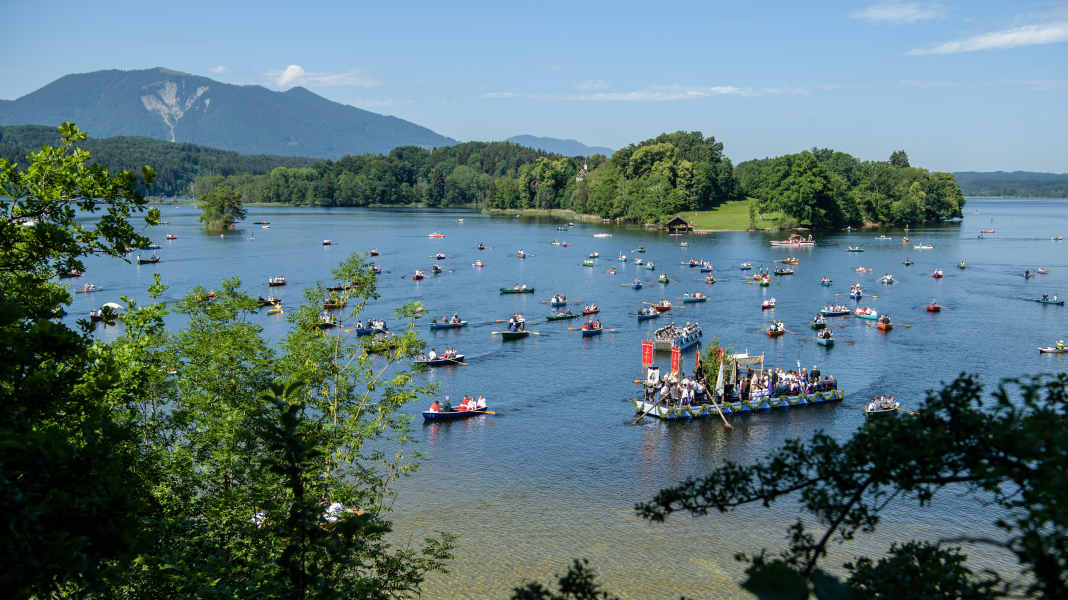
On Corpus Christi, the Blessed Sacrament, the body of Christ, is carried through the streets in a monstrance. In many regions, special traditions have developed over the centuries that make the festival an impressive spectacle - especially in the form of processions on rivers and lakes. These extraordinary celebrations take place in Germany, Austria and Switzerland, among other places.
From land to water
The origins of Corpus Christi processions can be traced back to the 13th century. The feast day was introduced by Pope Urban IV in 1264 to increase devotion to the sacrament of the Eucharist. The processions symbolise the presence of Christ in the Eucharist and are a public profession of faith.
Originally, these processions took place in towns and cities, but over time the tradition of celebrating on water developed in many regions.
Festively decorated carriages
In Christian tradition, water symbolises life and purification. Celebrating the festival on a lake or river harmonises the worship of the holy sacrament with nature and reminds us of spiritual purity. Such processions are therefore particularly common in the Alpine regions, along Lake Constance, on the Bavarian lakes and in the river valleys of Germany, Austria and Switzerland.
On Lake Hallstatt, for example, the Corpus Christi procession is held on countless traditional boats decorated with flowers and wreaths - so-called "Fuhren". The local Corpus Christi marksmen start their part of the procession at six o'clock in the morning: starting at the end of the village, they continue on Lake Hallstatt and then make their way to the church. Traditionally, a shot is fired every hour on the hour - from a gun carriage on the lake.
Since 1632, Corpus Christi has also been celebrated in Traunkirchen in the form of a lakeside procession. Many festively decorated boats accompany the sky procession and the counter procession to three stations on the lake. Visitors can experience the procession on the water, either on a guided tour or in a decorated electric hire boat from a local boat hire company.
And in Seehausen am Staffelsee, the annual lake procession takes place, which is unique in Bavaria. After Holy Mass, the procession sets off on a ferry to the island of Wörth. Accompanied by many small boats with festively dressed worshippers, the presence of Jesus Christ is remembered in the consecrated bread and wine. Once on the island, the congregation makes its way to the altar in the St Simpert Chapel.
The blessing over river and land
Further north, on the Rhine near Cologne, the Mühlheimer Gottestracht is held. It was first mentioned in a "Weistum" of the 16th century. Today, the procession, which is accompanied by a large parade of boats, moves from the Church of Our Lady to the landing stage north of St Clement's Church, where the Blessed Sacrament is carried onto the "MS RheinFantasie". Accompanied by many passenger ships and private pleasure boats, the route leads upstream to the former city limits of Mülheim. The ship of the Köln- Düsseldorfer Schifffahrtsgesellschaft then drifts back to Clemenskirche. There, the traditional "blessing over river and land" is given.
Anyone can take part in the procession. Tickets are sold for the journey on the procession boat. Participation on an accompanying boat is also possible. If you wish to accompany the procession on a private boat, please register informally.
Reverence for the forces of nature
The Corpus Christi processions on rivers and lakes are not only a religious ritual, but also an expression of cultural identity and a bond with nature. For example, the procession is held because the weal and woe of the citizens of Mülheim once depended on the Rhine. By blessing the land of the formerly free city of Mülheim am Rhein and the river, the inhabitants pray that the mighty river remains tamed and does not destroy the fruits of their labour as a force of nature.

